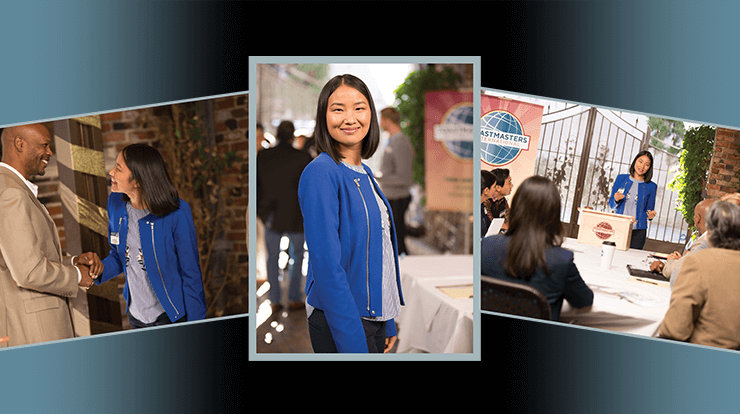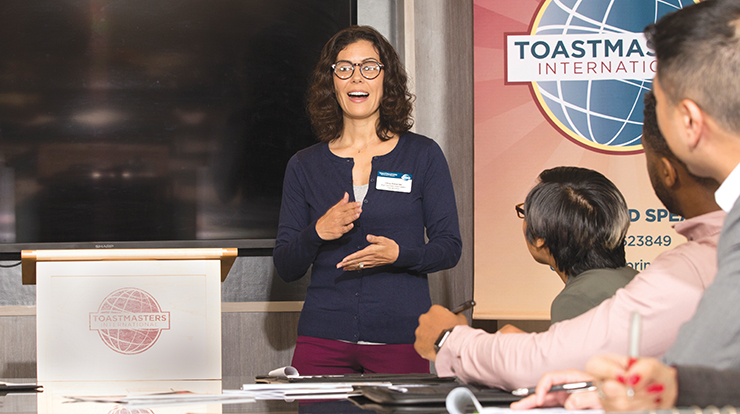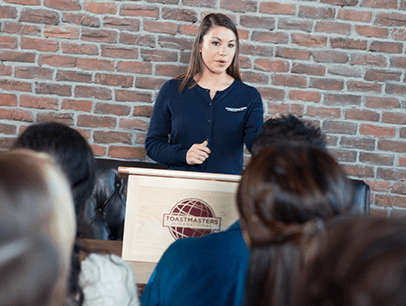Gavin Meikle, DTM, and the hosts of The Toastmasters Podcast talk about tips for giving participants the best training experience, and Gavin shares advice on dealing with training challenges.
If you’ve ever been to a Toastmasters training for officers, or participated in a collaborative learning process at work, you’re probably familiar with a trainer. While trainers need many of the same skills as a speaker—comfortable delivery, effective body language, the ability to engage audience members—they also require an additional skill set: the ability to facilitate.
Rather than simply presenting information as a speaker, trainers also need to help participants learn new skills. They must foster a two-way learning process that involves the audience’s active participation. As a trainer myself, I’ve seen how important this process is.
“A trainer needs to be a superb facilitator, keeping the spotlight on the participants,” says Andrei Popescu, DTM, a professional trainer in Bucharest, Romania, and a member of Toastmasters Club Bucharest.
Cindy Laatsch, DTM, helped conduct Toastmasters District Leader Trainings as a Region Advisor from 2019 to 2021. Her perspective is that both the facilitator and District officers learn from each other. “They have just as much data to share,” Laatsch says of participants, “and we’re in this journey together.”
How Adults Learn
Participants in training sessions are often referred to as adult learners, and the first step in developing a trainer mindset is understanding how adults learn best. Experts in the field say adults thrive when they are in control of their learning, such as taking part in discussions and hands-on activities. When they participate, they are engaged and retain more information.
That’s why presenters focus on content, whereas trainers focus on content and process. An e-learning module for Toastmasters’ online District Leader Training states, “The best trainers use the right mix of presentation and facilitation and the right combination of telling and listening.”
The distinction between simply telling someone what to do versus teaching them how to do it requires shifting the focus to others.
“That can be challenging for members because many people join Toastmasters to be in the spotlight themselves,” says Popescu, a Past District 95 Director. “Making the transition from charismatic speaker to participant-focused facilitator is a key mindset switch that needs to occur.”
The Toastmasters e-learning module, called Club Support and the Importance of Training, states the “definition of facilitate is ‘to make easier,’ and great trainers make it easier for club officers to be successful.”
Such trainers actively involve the participants with group activities and facilitated discussions about real club challenges. They also encourage the officers to share best practices and ask each other for advice, suggestions, and ideas.
“When I facilitate, I want to be seeing things with the freshest of eyes, like how [the participants] are seeing it.”
–Cindy Laatsch, DTMLaatsch, the former Region Advisor, says District Leader Trainings can have great value for District officers. As a facilitator, she was eager to share her own experiences as a leader and work through issues with fellow members.
“I came from a point of wanting to help. I was in each of their roles—I had been Club Growth Director and Program Quality Director and District Director. I loved sharing what
I didn’t do and wished I had done better.”
Understanding the Subject
To be able to adapt and respond to a diverse group of learners in an interactive learning environment, a trainer must first possess in-depth knowledge of the subject being taught. Lisa Marie Gelhaus is a corporate trainer and member of two Toastmasters clubs in Bologna, Italy. She helps business executives become more persuasive communicators.
“Trainers have to be truly knowledgeable about their topics,” Gelhaus says. “As a Toastmaster, if you give me an afternoon to do some research, I could give a pretty good speech about anything; but I can only train on a topic that I know inside and out.” She says participants can sense when a trainer is unprepared, and will quickly tune out.
Laatsch, a member of three clubs in Wisconsin, agrees it’s important to thoroughly know your material. But once she has done that, she also tries to “unlearn it”—in other words, liberate herself from rigidly adhering to pre-planned points and wording.
“I allow myself the freedom to be present,” she says. “When I facilitate, I want to be seeing things with the freshest of eyes, like how [the participants] are seeing it.”
 The author, shown here leading a training session, has been training in communication and interpersonal skills for more than 25 years.
The author, shown here leading a training session, has been training in communication and interpersonal skills for more than 25 years.How Toastmasters Helps
The Toastmasters program can help you develop effective training and facilitation skills. Being a member has helped me become a better trainer by enabling me to hone my speaking skills and teaching me the value of being clear and concise.
Gelhaus, the member from Italy, says, “Toastmasters prepares you for expressing your ideas, facing the unexpected, and communicating with and leading people.”
Conflict-resolution skills can also come in handy for a trainer. Tensions can sometimes arise in training sessions—for example, if a participant is upset by something in the content. Toastmasters develop skills that help in these situations, such as learning how to thoughtfully deliver, and receive, constructive criticism, and creating safe spaces in club meetings. Laatsch says it’s critical for facilitators to establish a safe, friendly environment where all viewpoints are heard and discussed respectfully. If someone is unhappy about an issue, the best thing to do is listen and be authentic in your response.
"A trainer needs to be a superb facilitator, keeping the spotlight on the participants."
—Andrei Popescu, DTMAnother thing Toastmasters emphasizes is servant leadership—placing a priority on helping others. That contributes to the facilitator mindset of putting the spotlight on participants. And it’s why training and facilitating can be so fulfilling, says Laatsch.
“It’s very rewarding to think you in some way have had a positive influence on someone,” she says. “That’s why I’m a Toastmaster for life.”
Seize Opportunities
Adopting the mindset and the techniques used by trainers will take your speaking skills to a higher level. Whenever you attend a workshop, ask yourself, What was it that made it great? What did the trainer do that made it memorable? Take notes and look for opportunities to test them out for yourself as soon as possible.
As Popescu says, “Embrace all opportunities to practice. I encourage all new trainers to always understand the ‘why’ behind the need, the actual goals and challenges behind an articulated request, then gear the training toward that end.”
Most clubs run short educational sessions throughout the year. These events provide you with the ideal opportunity to dip your toe into the water. Speak to your club’s Vice President Education and let them know you would like to have a go at running an educational session.
You already know the benefits of having an experienced speaker as a mentor, so why not find yourself a training mentor? Be courageous and speak to trainers you admire. Attend Area, Division, or District events and ask such individuals to help you. Most professional trainers have benefited from mentoring and are often willing to repay that debt by passing on their experience to others.
When I started my career, I never expected to be a professional communication skills trainer, but I am immensely grateful that I took that particular path. It’s been an exciting journey of self-discovery. The skills and fresh perspectives I have learned have proved immensely valuable and fulfilling.
Looking back, I can see that being a trainer has made me a better speaker by helping me to be clear about my speech objectives and reminding me that the most important people in the room are the audience members, not the speaker.
Gavin Meikle, DTM has been training in communication and interpersonal skills for more than 25 years and has been a Toastmaster since 2005. He is a member of two clubs in England: Solent Speakers in Fareham and Spinnaker Speakers in Portsmouth. He is the author of The Presenter’s Edge: How to Unlock Your Inner Speaker and has led multiple Toastmasters workshops at club, Area, Division, and District levels.
Related Articles

Club Officers
You’re a Club Officer—Now What?

Leadership
Shine as an Area Director

Toastmasters News





 Create a Learning Space
Create a Learning Space
